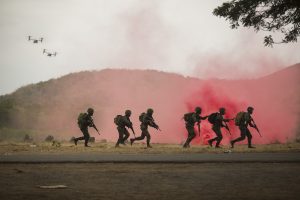Late last week, Thailand’s Ministry of Defense announced plans to cut the number of army generals by half over the next four years – in a likely attempt to pre-empt the military reforms promised by the progressive Move Forward Party (MFP) following its election victory last month.
By the year 2027, the ministry aims to halve the current number of army generals, which currently stands at around 1,200, spokesperson Col. Jittanat Punnotoksaid told reporters after a meeting of the country’s defense council chaired by Prime Minister Prayut Chan-o-cha, who also serves as defense minister, according to BenarNews. Additionally, the army plans to reduce its ranks by 12,000 and cut the number of required annual recruits from 100,000 to 90,000. These measures are estimated to result in annual savings of approximately 3 billion baht ($86 million) in the defense budget, the report stated.
The meeting of the council was held to discuss plans to prepare the military’s “forces to be able to carry out missions efficiently by improving the structure to be compact, streamlined, and modern,” Jittanat said.
The reforms are certainly welcome. Thailand’s military has long been notoriously top-heavy, in large part because military promotions are made on the basis of political and patronage ties rather than solely on merit. This is both a cause and effect of considerable bloat in the army that costs billions of baht annually, despite Thailand not facing any serious external threat.
The announcement follows a pledge by the MFP and other opposition parties to end conscription and reduce military spending, part of a broader attempt to reduce the military’s role in Thai politics and establish greater civilian control of the armed forces. Calls for military reform have become louder since the military coup of 2014.
Whether or not the Defense Ministry’s announcement has anything to do with the MFP’s likely reforms is unclear. Opposition parties have called for cuts to the military budget and other reforms for some time, and the military has promised them, though progress on reform has been slow.
Prayut has reportedly insisted that the streamlining reforms were planned long ago and had nothing to do with the MFP’s promised changes. Between 2017 and 2021, the armed forces reduced the number of military personnel by 8,000, and in 2021, the Royal Thai Armed Forces introduced guidelines under which unnecessary units would be removed, while the establishment of new units under high-ranking officers would be suspended. The new guidelines aimed to cut the number of high-ranking officers – major generals, rear admirals, and air vice marshals, some of whom served as salaried “advisers” and “consultants” – by 5 to 10 percent, mostly by attrition via retirements.
But as Paul Chambers, a specialist on the Thai military, noted at the time, a military reshuffle in April 2021 did nothing to advance that aim. “Wide-ranging proposals for military reform, covering such areas as conscription, soldiers’ welfare, military landholding, civilian control, laws bearing on national security, and procurement have been made,” he wrote. “But few if any changes have occurred.”
Ahead of another reshuffle in October 2022, Chambers noted that there were army appointments involving 458 generals and a further 169 in the police force. He described 2022 as “another year of top-heavy promotions to flag rank for both the Thai military and the country’s police.”
In this context, it is not hard to see the announcement of ambitious plans to slash the officer corps of the armed forces as an attempt to get ahead of potential reforms by a “hostile” opposition government led by the MFP. Given the fundamentally political role that the military serves, and the factional and patronage constraints facing any reform, it remains open to question just how far these reforms can go.
































